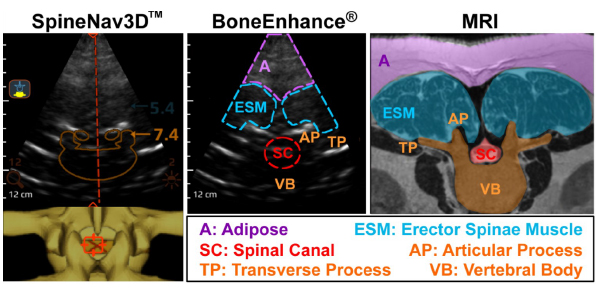An Accuro Success Story:
Rapid Placement Of Neuraxial Block In Morbidly Obese Parturient To Avoid General Anesthesia.
Beth Ann Clayton, DNP, MS, CRNA — Associate Professor of Clinical Nursing, University of Cincinnati
BACKGROUND
Neuraxial ultrasound is proven to increase spinal and epidural success; however, a steep learning curve has prevented widespread adoption of this technology. Accuro’s SpineNav3D™ technology eases the training burden by automating identification of spinal midline, landmark detection, and depth to the epidural space. Clinical benefits of Accuro are particularly pronounced in the morbidly obese population where palpation alone cannot reliably identify an appropriate needle insertion site.
CASE STUDY
The Accuro device provided essential landmark information that enabled the administration of an efficient and effective neuraxial anesthetic in a morbidly obese (BMI 52) parturient. Prior to utilization of the Accuro device, this laboring patient received two consecutive epidurals from experienced anesthesia providers. Each epidural failed to provide adequate bilateral pain control and was extremely difficult to place, requiring multiple attempts. Due to inadequate labor progression, a cesarean delivery was planned. Preoperative assessment determined the existing epidural had failed, and a third anesthetic would be required. I utilized the Accuro device with less than 2 minutes of scanning to place a working Combined Spinal-Epidural (CSE) anesthetic after only one minor needle redirect. Total placement time was less than 5 minutes. The CSE worked perfectly, pleasing both the surgeon and patient. Under normal circumstances, this patient was at a high risk of receiving general anesthesia due to an inability to place a successful neuraxial block.
CONCLUSION
The Accuro facilitated rapid identification of spinal midline and detection of the intervertebral space in a morbidly obese patient with impalpable landmarks. The information provided by Accuro’s SpineNav3D technology was not obtainable with palpation alone, as evidenced by the two prior failed epidural placements from providers who did not utilize image guidance. With Accuro, the neuraxial block was placed quickly and successfully, requiring only a minor needle adjustment. The ability to administer neuraxial anesthesia with fewer needle insertions may result in higher patient satisfaction and reduction in complications. In this instance of neuraxial anesthesia for a morbidly obese patient undergoing cesarean section, an accurate neuraxial placement avoided the use of general anesthesia. Providers may consider the potential benefits of utilizing the Accuro technology to improve patient and provider satisfaction, reduce costs for operating room time and anesthesia equipment, decrease patient complications, avoid general anesthesia during childbirth, and facilitate immediate skin-to-skin contact after delivery.

Accuro handheld device in use to localize the epidural space prior to placement of neuraxial anesthesia.

Figure 2. Clinical Accuro images from a morbidly obese parturient with BMI greater than 50. The SpineNav3D™ image (left) as it appears on the Accuro device in real-time. The underlying BoneEnhance® image (middle) from the same subject is shown with manually annotated anatomy matched to an MRI of the lumbar spine (right). BoneEnhance® is a proprietary image reconstruction technology with greater bone-to-tissue contrast compared to conventional B-mode ultrasound.
